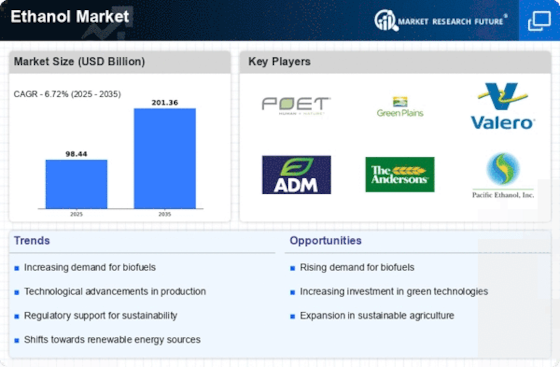Top Industry Leaders in the Ethanol Market
 The ethanol market, encompassing both fuel and non-fuel applications, is a dynamic and ever-evolving space. Understanding the competitive landscape, including key players, strategies, and recent developments, is crucial for navigating this complex industry. This 1000-word analysis delves into the market's essence, highlighting its competitive landscape, key players, strategies, recent developments, and market share factors.
The ethanol market, encompassing both fuel and non-fuel applications, is a dynamic and ever-evolving space. Understanding the competitive landscape, including key players, strategies, and recent developments, is crucial for navigating this complex industry. This 1000-word analysis delves into the market's essence, highlighting its competitive landscape, key players, strategies, recent developments, and market share factors.
Competitive Landscape:
-
Fragmented Market: The market is fragmented with a mix of large integrated players, regional players, and small-scale producers. -
Key Players: Some of the major players include Archer Daniels Midland Company (ADM), Cargill Incorporated, Cosan S.A., Raizen, Buhler Industries, Tereos, Poet, and Valero Energy Corporation. -
Competitive Strategies: Players are adopting various strategies to gain market share, including investments in advanced production technologies, expansion into new markets, diversification into non-fuel applications, and partnerships with other companies.
Factors Influencing Market Share:
-
Production Capacity: Players with larger production capacities have a cost advantage and can cater to larger demand. -
Feedstock Sourcing: Efficient feedstock sourcing strategies that ensure consistent supply and competitive prices are crucial. -
Technological Innovation: Investment in advanced production technologies like cellulosic ethanol can improve efficiency and reduce costs. -
Geographical Presence: Presence in growing markets like Asia Pacific provides a competitive edge. -
Product Portfolio: Offering a diverse product portfolio catering to different applications attracts a wider customer base.
Key Players
- Kirin Holdings Company (Japan)
- Aventine Renewable Energy (US)
- United Breweries (India)
- Archer Daniels Midland Company (US)
- The Andersons
- British Petroleum (UK)
- Advanced BioEnergy LLC (US)
- Cargill Corporation (US)
- VeraSun Renewable Energy (US)
- Pernod Richard (France), among others
Recent Developments :
August 2023: The US Environmental Protection Agency (EPA) proposed increasing the biofuel blending mandate under the Renewable Fuel Standard (RFS) for 2024, potentially boosting ethanol demand.
September 2023: Raizen announced a partnership with BP to develop and distribute low-carbon fuels, including cellulosic ethanol, in Brazil.
October 2023: ADM and Cargill invested in a joint venture to build a large-scale cellulosic ethanol production facility in the US.
November 2023: The European Union proposed a revised Renewable Energy Directive (RED III) setting ambitious targets for biofuel use, including advanced biofuels, potentially impacting the European ethanol market.
December 2023: The global ethanol market witnessed supply disruptions due to adverse weather conditions in key producing regions like Brazil and the US.










